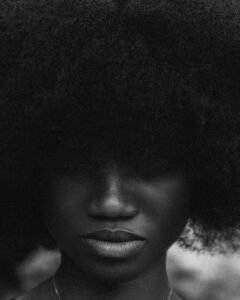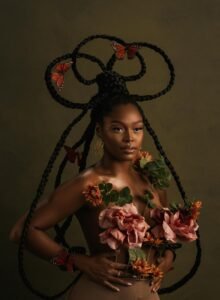Why I Celebrate Black Women’s Hair Choices
By BlaqKharma / January 13, 2025 / No Comments / Life
Hair is our crown of glory. It’s a universal truth, transcending gender, culture, race, and geography. Our hair is personal yet public. It’s a statement, an identity, and a canvas for art. Hair tells stories without a word. For many, it reflects their growth, rebellion, culture, or survival.
For Black women, hair symbolizes our complex identity and resilience. At the same time, it is also one of the most scrutinized aspects of our existence. Over time, I’ve come to understand the complexities of hair choices and the harm in judging others for how they wear their crowns. In this sincere write-up, I hope to inspire respect for every woman’s right to express herself through her hair.
My early hair journey
My journey with hair began early. At three, I was introduced to relaxers. You know, “the creamy crack.” For much of my life, this was my “normal”. My thick hair was relaxed, braided, weaved, and styled in every way imaginable. I took pride in caring for it as a youngin.
 In my mid-twenties, I reached a turning point. Maintaining weaves became exhausting and expensive (I always did my own hair, but still). I started to question, “Who am I?” This made me question straight hair as the “ideal” hair. I realized that this aesthetic wasn’t authentically me. This is when I decided to embark on my natural hair journey. I let the creamy crack grow out and embraced my natural hair.
In my mid-twenties, I reached a turning point. Maintaining weaves became exhausting and expensive (I always did my own hair, but still). I started to question, “Who am I?” This made me question straight hair as the “ideal” hair. I realized that this aesthetic wasn’t authentically me. This is when I decided to embark on my natural hair journey. I let the creamy crack grow out and embraced my natural hair.
As I transitioned to my natural hair, I entered a phase of hypercriticism of myself and others. I questioned everything about black hair culture and the choices many of us made as black women. In my mind, weaves and wigs became symbols of self-hatred and assimilation to European beauty standards.
I ignorantly believed others should side with my logic because I had embraced my natural hair. It’s hard not to feel cringe as I write this… I started criticizing Black women who continued to wear wigs or weaves, thinking they hadn’t “evolved” like I had. Somehow, I equated their choices with a lack of self-love and completely ignored the complexities of individual experiences.
Looking back, I see how arrogant and narrow-minded this perspective was. My evolution was mine alone. It was NOT a universal truth.
Growth is a humbling process. As I lived more, listened more, and learned more, my perspective shifted. I began to study the rich history of black hair. There, I began to understand how it had always been a canvas for creativity and expression. I learned how our ancestors used intricate hairstyles to communicate social status, tribal affiliations, and even escape routes during slavery. Hair has always been about more than beauty. It has been about survival, identity, and resistance. Still, there is more…
Through conversations and testimonies, I started to hear the stories of women whose hair choices were born out of necessity rather than vanity. Some wore wigs because of medical conditions like alopecia, chemotherapy, or hormonal changes. Others faced hair thinning from aging, postpartum changes, or medications. These stories opened my eyes to a reality I hadn’t fully considered. For many women, hair loss isn’t just a physical change. It is an emotional wound.
Alopecia, for example, can leave women feeling powerless and isolated. The condition, which causes partial or complete hair loss, often manifests without warning and can be unpredictable. Women with alopecia frequently face stares, questions, and even unsolicited comments from strangers, compounding the emotional toll of the condition.
For many women facing struggles like these, wigs and weaves become lifelines. They provide an opportunity to reclaim a sense of self, to feel beautiful and confident despite what they’re going through. The choice to wear a wig or weave in these circumstances isn’t about vanity. It’s about survival, dignity, and empowerment.
Hair as Freedom
 Today, I firmly believe that your hair is your freedom. Every black woman deserves the autonomy to wear her hair however she pleases without fear of judgment. Her choice is valid whether she wears it natural, relaxed, braided, locked, weaved, or shaved.
Today, I firmly believe that your hair is your freedom. Every black woman deserves the autonomy to wear her hair however she pleases without fear of judgment. Her choice is valid whether she wears it natural, relaxed, braided, locked, weaved, or shaved.
Our community has long been subjected to external scrutiny over our hair. From corporate dress codes to school policies, society has tried to dictate what is “appropriate” or “professional” for black hair. These battles are exhausting, and the last thing we need is internal policing from within our own community.
We don’t know everyone’s story. We don’t know their struggles, preferences, or motivations. And even if we did, who are we to decide what’s right for someone else?
My journey has taught me the importance of empathy. The path to self-acceptance is deeply personal, and for many, hair is an integral part of that journey. Demonizing someone for their hair choices does nothing but perpetuate division and shame.
Instead of judging, I now celebrate the diversity of black hair. I marvel at the creativity and versatility of our styles. One day we can rock an afro and the next day, a sleek bob or waist-length braids. I find joy in the stories and expressions behind each style, knowing that every woman’s choice is her own.
As Black women, our hair is a source of pride and power. It’s a reflection of our individuality and our collective resilience. But that power diminishes when we use it as a weapon against one another. When we embrace our differences, we create space for unity and growth for everyone.
